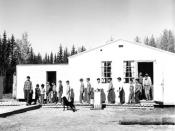University Center, the dorm I've been living since I came to Chicago. Some people call my dorm the Super Dorm, because of the size of the dorm. The University Center is an 18-story building in which 1,680 students live. Residents of UC are from three different institutions: Columbia College, DePaul University and Roosevelt University. About half of the rooms are apartment style, which have four bedrooms, a kitchen, a living room, and two bathrooms with bathtubs. The other half is a traditional style dorm, which we call suites. A suite room has one bedroom with two beds and a bathroom with a shower, toilet, and two sinks. The bathroom is connected to another bedroom. The 16th, 17th and 18th floors are called premium floors, which are usually for students who are 21 and older. (Sheridan)I started this research, because I wanted to research not just my dorm but also especially my hallway because everyone in this hallway knows one another and we make a special community, which is almost like one big family.
As I research about dorm lives by taking field notes on my hallway, and gathering secondary sources like books and articles, the research got more and more interesting to me. First of all, dorm is a very strange way of housing. There is no other place where hundreds of same age people live together and share a lot of things with each other. Second of all, I live in one of the premium floors, so most of people are 21 and older on my floor. When you are younger than most people, it will of course influence your position in the community. Surprisingly, there are a lot of resources that give me information about more interesting things such as gender difference in the community and race.
My ethnographic research on my hallway at University Center has been very successful, but you are probably wondering why you should care about a research on some college dorm. Some of you might live in a dorm and some might not. You may not even go to a college. So, why should you care about my ethnographic research? I can give you a million reasons why you should care about my research project, but in this paper, I would like to talk particularly about the three reasons. First, the research on college dorm can be related to other communal housing places or anywhere you see the same faces everyday and have to share your properties with others. Second, considering that many students pay more to live in a dorm, my research on college dorm will leads you into another topic, "what kind of value do people look for homes?" Last, I will talk about why those values people seek for homes change as they get older, just like most college students move out of their dorms after freshman or sophomore year.
Now you can see how my research is related to you, and I'm sure you are pretty excited to read more about my research. I will start from the first topic I mentioned, the comparison of college dorms, other communal housings, and any places that you see the same faces and have to share your properties with others. If I compare my dorm to other communal housings, such as prisons and nursing homes, you might not find any connection between this topic and your life, but think other way. There is not one person in this world that lives completely alone. Everyone shares his/her properties with other in some ways. If you have roommates, a partner or family members who live with you, of course you share a lot of things with them, space, time, food, etc. However, even if you live by yourself, you share your properties with your neighbors, your co-workers, and your classmates. I think our society itself is an example of a communal living.
Obviously, sharing your properties with your neighbors, co-workers, classmates, or people you meet at a coffee shop is nothing like living with others. Bruce Sacerdote says in his article, "I find that peers have an impact on grade point average and on decisions to join social groups such as fraternities." (Sacerdote) Those people who live with you or you see everyday can have a lot of influences on you. For example, Sacerdote talks about how roommates affect each other's GPAs, because people are most likely to have similar schedules and same crowd to hang with. Same thing often happen in work places. When people work in the same place, you are most likely to have same type of schedule. Many co-workers who get off their works at the same time go out together and hang with same kind of crowds. Having same friends can make people behave similar to each other. Those people who are around you can change your behavior, thoughts, interests, etc. through my research, you will see how dorm mates affect each other's life, and you will be able to apply their lives to yours. (Seaman p.17-40)We, humans, habitually put ourselves into some kinds of groups. We belong ourselves to our work, school, family, group of friends, and people you live with. We like to be involved in a community. In my school, people pay more to live in one of the dorms. We pay more to live and share your properties with a thousand other people, because as college students, the value we are looking for a home is to be able to get to know as many people as possible. The vale of home is another thing you can compare yourself to us, college students who live in a dorm, but in some college students find more value in houses they can live only with their friends or family. Some real estate businesses limit their marketing target to college students, so they can bring properties that are hard to let or sell back into use. (Baxter)So, what kind of vales do you look for a home? Some people like to live close to their work places and their schools. Some people like to have good neighbors. Some people like to live anywhere cheap. Different people find different value in homes. Author of Will This Place Ever Feel Like Home?, Leslie Levine, says a home is more than just a shelter. When a woman with a baby moves, she would look for a home in an area where she can meet other women who she can become friends with. She will watch each other's children grow and be friends for a lifetime. Just like that, college dorm mates become friends, watch each other changing through the year they live together, and some of them end up becoming friends for a lifetime. Even though people expect different things for their homes, people's thoughts are similar to one another more than you think. You will be surprised how comparable college dorm lives are to your lifestyle, as my research gets deeper. (Levine p.106-120)My research project will also cover how the values people look for their homes change, as they get older. Most college students live in a dorm in their freshman year and maybe sophomore year, but after those two years, they move out. According to Rebekah Nathan, a professor who lived in a college dorm for her ethnographic research, 10 percent of her dorm population change by the time her first semester ended and 25 percent by the third week of her second semester. No matter how nice your dorm mates are, no matter how happy you are in the dorm, you will probably move out of the dorm after so many years. Most students don't stay in dorms until they graduate, because the value they seek for a home change. A lot of young people tend to like living in a city, but after so many years, some of them move to the suburbs. Then some of those people who moved to the suburbs move to countryside after they retire. (Nathan p.19-40)Jim Connlly says, "While college dormitories are where most students live when they go away to school, some baby boomer parents are exploring another option: buying a residential property for their child to live in near school," because when they become Junior, college dorms are not going to be good enough for them. (Connolly) College dorms have been labeled residential hall, living-learning center, house, home away from home, or zoo, according to Student Housing and Residential Life. Typically, junior year is when a college dorm turns into a zoo. One of my friends, who is a junior in my college, says, "I love visiting your dorm and hanging out with a lot of new people, but I cannot live here anymore. I need my own quiet time, every once in a while." Just like the dorms turned into zoo for him, after a while, cities turn into zoo and people move to the suburbs. Then after that, people start feeling like the suburbs turn into zoo, so they move to countryside. (Winston and Anchors p.134)In my opinion, college dorms are just a smaller scale of our society. How those people you share your time and properties with influence you and your life, what kind of values people seek to a home, and how the values change. Everything happens to your life also happens in a college dorm. When I started my research on my dorm hallway, I thought dorms are so much different from all the other kind of housing styles, and I still do believe that college dorm lives are very unique, however, through the process of writing this research paper, I have realized how a dorm life corresponds with real world. I see my dorm hallway as a small village now.
As much as my interest got deeper by making connections with the secondary sources, I am sure your interest towards my research got deeper as well. By researching this village, called the University Center, I am not only going to describe and explain how life is like in my dorm, but also I am hoping that this research will allow me to discover the lives outside of this dorm.


